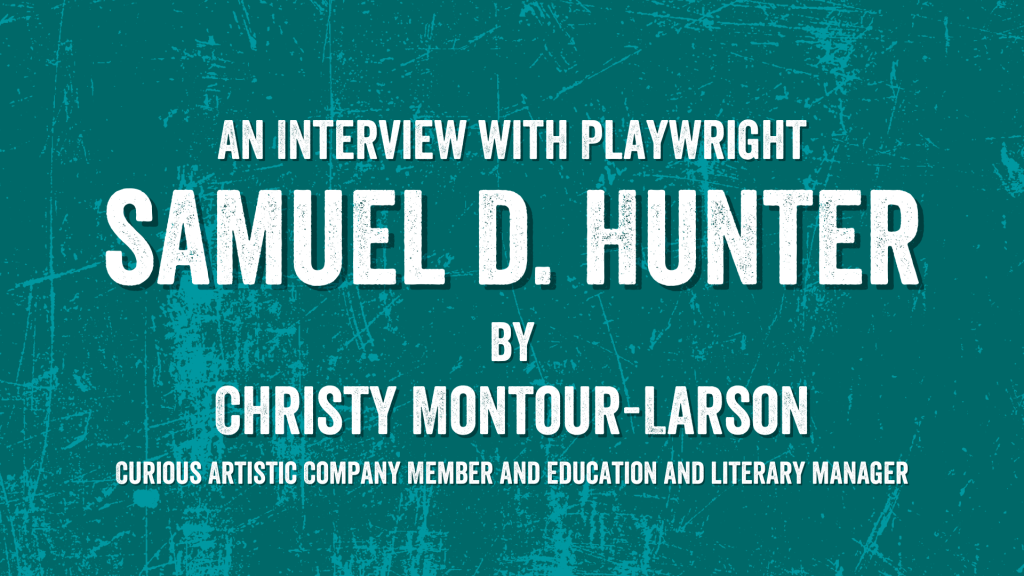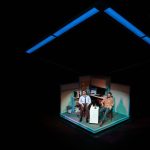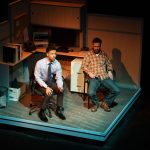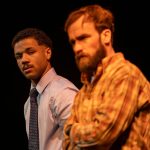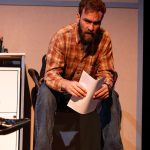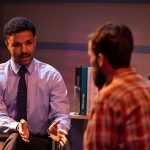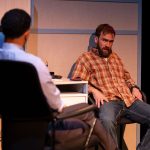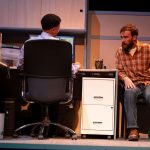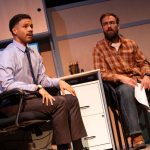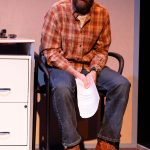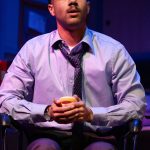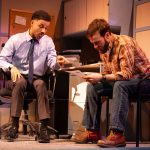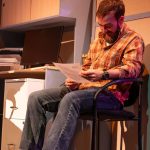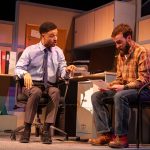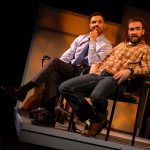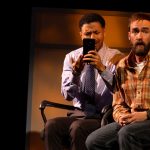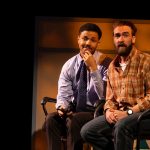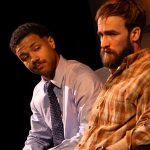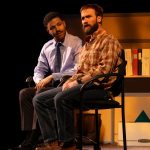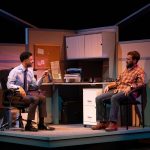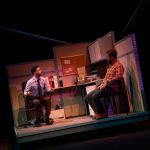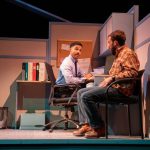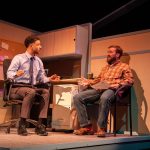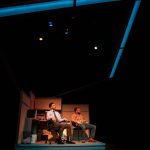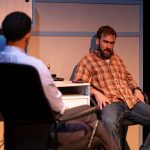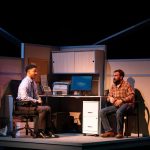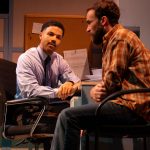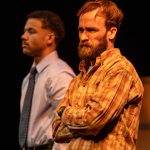- Samuel D. Hunter
- Warren Sherrill
- January 18 - February 16, 2025
- January 16-17
- Buy Now
Regional Premiere
Poignant. Profound. Paternal.
Curious Theatre Company presents A Case for the Existence of God, a riveting production by Samuel D. Hunter, acclaimed playwright of The Whale. This regional premiere of the Broadway hit offers a poignant exploration of the lives of two single fathers, expertly directed by local luminary Warren Sherrill. Delving into their connection forged by a shared sense of melancholy, Hunter’s masterpiece promises an unforgettable theatrical experience, challenging audiences to contemplate life’s deepest questions with profound insight and emotional resonance.
Digital Playbill
CONTENT ADVISORY: Curious offers a public advisory about any stage effect of potential concern to patrons’ health, such as strobe lights, theatrical fog or smoking. This production of A CASE FOR THE EXISTENCE OF GOD does NOT have any stage effects of potential concern to patrons’ health.
Curious also offers voluntary advisories about subject matter. If you would like to read the content advisory for A CASE FOR THE EXISTENCE OF GOD, click “Details” below.
Details
Details for A CASE FOR THE EXISTENCE OF GOD:This production contains strong adult language and some alcohol use. However as sensitivities vary from person to person, if you have any other concerns about content or age appropriateness that might have a bearing on patron comfort, please contact the Box Office at 303.623.0524.
Dates & Times
| Date | Time | Additional Information |
GO DEEPER: A CASE FOR THE EXISTENCE OF GOD
Compiled by Christy Montour-Larson
CONTENTS
- An Interview with Playwright Samuel D. Hunter
- Strength in Exposure: Exploring Masculinity and Vulnerability
- Idaho as Landscape and Metaphor: The Role of Place
- Home Ownership and Mortgage Broker
- Discussion Questions
- Denver Public Library Recommendations
AN INTERVIEW WITH PLAYWRIGHT SAMUEL D. HUNTER
Excerpts from Interview in American Theatre Magazine by Rob Weinert-Kendt
ROB WEINERT-KENDT: Where did this play come from and what’s that title about?
SAM HUNTER: I wrote the play before the pandemic. The very clear starting point was that we adopted a kid, right after we had a horrifically hard time buying this apartment. It just came from the sense of: These middle-class, normal things of having a family and owning an apartment don’t sound like they should be some of the hardest things you’ve ever endeavored to do; these should be sort of normal American things. But it was so incredibly complicated and so hard.
When I first started writing it, I was like, I don’t know if this is a play. I had this initial idea of two guys in a cubicle who don’t stand up. And I was like: That is not a good idea. But let me try. And the only thing that made me think, maybe this is a play, is when I came up with the title. Because I thought, maybe the movement of this play is: It has this title that could not be more grandiose, it’s as big as a cathedral, and then you walk in and there are two guys sitting in a cubicle talking about mortgages for a really long time. I don’t know if the play would fundamentally work without that title. The movement of the play is that it starts in this tiny, quotidian way, and it grows and grows and grows in an effort to meet that title.
I happened to be reckoning the fear of replicating patterns among generations. That fear seems to be very alive in your play too.
The idea the play implicitly talks about is that a life is actually quite short. A life is kind of a simple thing: You’re born, you age for an undetermined amount of time, and then you die. Ashes to ashes, dust to dust. But a day is incredibly long and complicated, and almost infinitely complex — getting through a day is like Ulysses. It’s this monumental thing.
I hear you on the daily struggle. I think it becomes particularly acute once you became a parent and are responsible for other humans.
Totally. Because I don’t have hope that is neatly delivered by a religion or a set of cultural values or the government or whatever. So, clearing all that away, it’s sort of like, where are the places that I can find hope for me and my kid in this deeply complicated world?
Shifting gears a bit, have you ever written a two-hander before?
I wrote a two-hander in graduate school. I love two-handers but they’re really hard to write. I probably had more first drafts, or skeletal drafts, of this play than any other play I’ve written. But I love the form, because you can just dive so deep.
Is the main challenge of a two-hander just varying it up, keeping it interesting?
I think the dramaturgy of the play is really trying to consistently offer the audience new information or a new turn, a new kind of perception shift on who these guys are, and what the nature of their relationship is.
You don’t live in Idaho anymore, but do you visit regularly? And do you feel you have to, to keep up with the state so that your plays about people there feel fresh?
I definitely go back to Idaho, at least twice a year. But, and I’ve said versions of this over the years, it’s just become a really useful container for me to be able to write about the kinds of people that I want to write about, which are people who exist in the margins in some way. I’ve just never had the instinct of like, writing about fashionable people in New York City.
When you talked about wanting to find a place of hope for you and your family, I wonder if you think of the theatre that way? I’m not the only person I know who thinks of theater as kind of a church.
Yeah. I’ve wanted to find a church for my daughter, not for the religion of it, but there is a physical thing that goes on when you pray together, or sing together, or chant together—that is something that humans are meant to do. Having gone to a fundamentalist Christian school, and having been outed [as gay] there, I felt very rejected and hurt by Christianity. But I still also feel a real pull toward that gathering and that communion. I think that’s why I started writing plays rather than novels or poems or whatever, because I’m really interested in that kind of shared experience. That sounds kind of pretentious.
If that’s pretentious, guilty as charged. Do you still feel that way, though, given the existential challenges theatres have faced in the past two years?
Yeah. I mean, the theatre is really suffering right now, that’s obvious. But there’s never not going to be an American theatre. We don’t know what it’s gonna look like; it might get really hard. If things get really hard, TV and movies might even go away, but theatre is never gonna go anywhere. We’re always going to need it. It’s always going to be made. I think maybe that’s one of the reasons that I wanted to write a play that can be produced so simply, because I don’t want there to be any barriers to being able to do this play.
STRENGTH IN EXPOSURE: EXPLORING MASCULINITY AND VULNERABILITY
Samuel D. Hunter’s play A Case for the Existence of God delves into the intricate relationship between masculinity and vulnerability through the evolving friendship of its two central characters, Ryan and Keith. Set within the confines of a small office in Idaho, the narrative explores how these men confront personal and societal challenges, revealing the complexities of modern masculine identity.
Masculinity and Vulnerability in the Play
Ryan and Keith, both grappling with issues of parenthood, financial instability, and personal trauma, find solace in their shared experiences. Their interactions challenge traditional masculine norms that often discourage emotional openness, highlighting the strength found in vulnerability. As noted in a review by Intermission Magazine the play’s potency lies in its gentle portrayal of male vulnerability and platonic intimacy, suggesting that the absence of such expressions can lead to self-destruction or harm to others.
Contemporary Perspectives on Masculinity and Vulnerability
Recent studies reported in The Times indicate a shift in how masculinity is perceived and expressed. A survey by the National Research Group found that nearly half of young men seek role models who display emotional openness and maintain meaningful friendships, moving away from traditional stoic figures.
However, challenges persist. Research published in the American Journal of Public Health suggests that adherence to traditional masculine norms correlates with poorer health outcomes, as men may avoid seeking help to maintain a facade of toughness.
Statistics on Male Vulnerability
- Mental Health: Men are less likely to seek psychological help, often due to societal expectations of stoicism. This reluctance contributes to higher rates of suicide among men compared to women.
- Health Behaviors: Men endorsing traditional masculine beliefs are more likely to engage in risky behaviors, such as heavy drinking and smoking, and less likely to pursue preventive healthcare.
IDAHO AS LANDSCAPE AND METAPHOR: THE ROLE OF PLACE
The setting of Twin Falls, Idaho, serves as more than just a backdrop in A Case for the Existence of God —it is integral to the characters’ emotional and existential struggles. As an Idaho native, Hunter often uses his home state to explore themes that resonate deeply with rural America: economic hardship, social isolation, and the search for identity and connection. These themes are not only central to the play but also reflect the broader realities of rural life, which is marked by distinctive challenges and complexities. The stark, often unforgiving Idaho landscape mirrors the emotional terrain of Hunter’s characters, whose lives are shaped by the isolation and limitations of their environment.
Economic Hardship in Rural America
The economic struggles of rural America, particularly in towns like Twin Falls, are central to the characters’ experiences in A Case for the Existence of God. Rural areas across the U.S. have long faced higher poverty rates than urban regions. According to the Economic Innovation Group, the average poverty rate in rural areas is nearly three percentage points higher than in non-rural areas. In A Case for the Existence of God, characters grapple with the reality of limited opportunities, often finding themselves stuck in jobs or situations they feel unable to escape. The shift from traditional industries like agriculture and mining to the service and retail sectors, which have seen the most job growth in recent decades, reflects the economic shifts that define many rural communities.
Social Isolation and Loneliness
Isolation and loneliness are central themes in Hunter’s play, and they are exacerbated by the setting of rural Idaho. National surveys show that approximately half of U.S. adults report experiencing loneliness, and this sense of isolation can be particularly pronounced in rural areas. According to one survey, nearly one in five rural Americans often feels isolated or lonely. This statistic resonates with the characters in A Case for the Existence of God, who are not only struggling with personal demons but are also emotionally distanced from those around them. Despite living in a small community, the sense of social separation is palpable, with few opportunities to truly connect in a meaningful way.
The Quest for Identity and Connection
The characters in A Case for the Existence of God are on a quest for meaning and redemption, mirroring the larger search for identity and connection that defines many rural Americans. About 17% of the U.S. population resides in rural counties, a demographic that faces unique challenges when it comes to forging a sense of community and belonging. For the characters in Hunter’s play, this search for connection is both personal and communal. They seek not only to make peace with their past actions but also to find a way to reconcile with their place in a world that often seems indifferent to their struggles.
FRAGILE FOUNDATIONS:
EXPLORING HOMEOWNERSHIP, DEBT, AND BELONGING
In Samuel D. Hunter’s play, A Case for the Existence of God, the pursuit of homeownership serves as a central motif, reflecting broader societal challenges related to financial stability, personal identity, and the complexities of the American Dream.
Homeownership as a Central Motif
The protagonist, Ryan, seeks to purchase a parcel of land that once belonged to his family, symbolizing a desire to reclaim his heritage and establish a sense of permanence. This quest underscores the emotional and cultural significance of homeownership in American society, where owning property is often associated with success, stability, and legacy.
Role of the Mortgage Broker
The figure of Keith, the mortgage broker could serve as a metaphor for the promises of the American Dream—the belief that homeownership is within everyone’s reach. Mortgage brokers are often seen as facilitators of this dream, but their role can also represent the dangers of financial instability, exploitation, or the fleeting nature of the idealized life that the characters seek.
Contemporary Context and Statistics
To contextualize the themes presented in the play, consider the following contemporary statistics:
- Homeownership Rates: As of 2024, approximately 64% of Americans own real estate, indicating that a significant portion of the population does not own their homes.
- Mortgage Prevalence: About 63% of U.S. homeowners have mortgages, reflecting the reliance on financing to achieve homeownership.
- Mortgage Rates: In 2024, mortgage rates have fluctuated, with the 30-year fixed mortgage rate averaging around 6.85%. This volatility impacts affordability and accessibility for potential homeowners.
- Home Equity: U.S. homeowners with mortgages have seen their equity increase by a total of $1.3 trillion since the second quarter of 2023, an 8% year-over-year gain, bringing the total net homeowner equity to over $17.6 trillion in the second quarter of 2024.
- Affordability Challenges: In 2024, homeowners are facing increased costs, with many paying more for home insurance and property taxes than their mortgage payments. This trend adds financial strain and affects the overall affordability of homeownership.
DISCUSSION QUESTIONS
- What does the title of the play mean to you? What could possibly be another title?
- Ryan and Keith’s relationship is central to the play. How does their dynamic evolve, and what do they teach each other?
- What moments of vulnerability between the characters were the most impactful for you?
- What role does the setting (Idaho) play in grounding their identities?
- Discuss the significance of the shared grief between Ryan and Keith, and how it creates a sense of connection despite their differences.
- How does the financial and legal system contribute to the characters’ struggles? What commentary do you think the play makes about systemic inequality in America?
- The play takes place in a small office. How did this confined space affect your experience of the story? How might the minimalistic setting underscore the themes of the play?
- How does the play resonate with your own experiences of loss, grief, and the search for meaning?
- Do you believe the play offers any hope or insight into the human condition?
- How did you feel the set, lights, costumes and sound added to your experience of the play?
The Denver Public Library recommends these library resources to enhance your theatre experience of A Case for the Existence of God.
READ
Commitment by Mona Simpson
This engrossing and empathetic novel follows the lives of three siblings after their single mother enters a California state hospital in the 1970s. The story shifts perspectives between each sibling over many decades, exploring themes of single parenthood, the foster care system, complicated relationships, and rebirth.
WATCH
Old Joy dir. Kelly Reichardt (2019)
Two old friends reunite for a quietly revelatory overnight camping trip. As they drive from Portland into the woods in search of a secluded hot spring, expectant father Mark and nomadic Kurt make fumbling attempts to reconnect, butting up against the limits of their friendship and coming to grips with just how much their paths have diverged since their shared youth.
LISTEN
Kid A by Radiohead
Some consider the fourth studio album, Kid A, by English rock band Radiohead to be one of the band’s best works as it defies musical genres and is a departure from their earlier sound. However, part of what makes Kid A so unique is that it represents a turbulent time for the band – all were suffering burnout from the intense touring for their previous album, singer songwriter Thom Yorke was experiencing writer’s block, and the band felt they were being made to live up to the success of Ok Computer and that other bands were copying their sound.
DOWNLOAD
The Heart of It All by Christian Kiefer
In a small town in Northern Ohio, the inhabitants are dealing with things that life throws at them. The novel is comprised of multiple distinct points of view, deeply intimate in nature of people connected to each other as family, coworkers, and friends, each carrying their own burdens. It’s a slice of life portraying the realities of how grief and loss take a toll on a family, the difficulties of race, blue collar work, and poverty – yet is balanced with scenes of friendship and acceptance, love in the midst of threat, and people doing the right thing.
